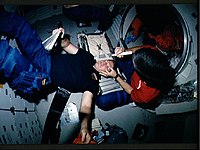
Photo from wikipedia
Exposure to actual or simulated microgravity results in alterations of renal function, fluid redistribution, and bone loss, which is coupled to a rise of urinary calcium excretion. We provided evidence… Click to show full abstract
Exposure to actual or simulated microgravity results in alterations of renal function, fluid redistribution, and bone loss, which is coupled to a rise of urinary calcium excretion. We provided evidence that high calcium delivery to the collecting duct reduces local Aquaporin 2 (AQP2)-mediated water reabsorption under vasopressin action, thus limiting the maximal urinary concentration to reduce calcium saturation. To investigate early renal adaptation into simulated microgravity, we investigated the effects of 10 days of strict bedrest in 10 healthy volunteers. We report here that 10 days of inactivity are associated with a transient, significant decrease (day 5) in vasopressin (copeptin) paralleled by a decrease in AQP2 excretion, consistent with an increased central volume to the heart, resulting in reduced water reabsorption. Moreover, bedrest caused a significant increase in calciuria secondary to bone demineralization paralleled by a decrease in PTH. Urinary osteopontin, a glycoprotein exerting a protective effect on stone formation, was significantly reduced during bedrest. Moreover, a significant increase in adrenomedullin (day 5), a peptide with vasodepressor properties, was observed at day 5, which may contribute to the known reduced orthostatic capacity post-bedrest. We conclude that renal function is altered in simulated microgravity and is associated with an early increase in the risk of stone formation and reduced orthostatic capacity post-bedrest within a few days of inactivity.
Journal Title: Frontiers in Physiology
Year Published: 2022
Link to full text (if available)
Share on Social Media: Sign Up to like & get
recommendations!